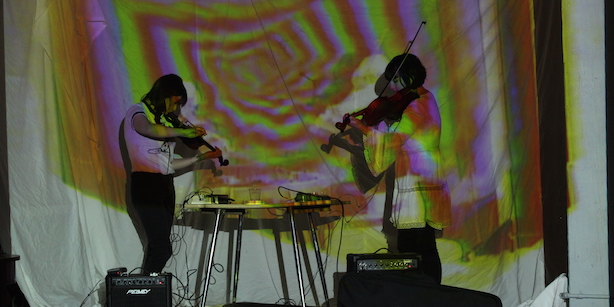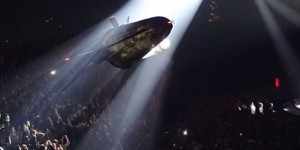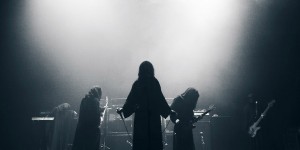 Music
Music
National Drone Day celebrates sound, solitude, and serenity
by Max Mohenu
May 27, 2016
Drone Day founder Marie LeBlanc Flanagan discusses the intersection of music and mental health.
Photo: The Olm, Edmonton Drone Day 2015
Here in Canada, we have the opportunity to celebrate various music communities and culture throughout the year. National Drone Day is a yearly holiday for weird music lovers that explores the relationship between music and mental health, promoting inclusivity and safe space through therapeutic practices and group discussions.
On Saturday, May 28th, Drone Day brings together lovers of ambient, experimental, new age, and various other sound palletes through group drone performances and moderator-led, judgement-free forums for personal reflections, stories, anecdotes, and literature. Going into its third year, Drone Day will not only be celebrated at Toronto’s Music Gallery, Ratio, and in the streets but also in major and smaller towns and cities all over Canada (and internationally for the first time).
While a peaceful vibe encompasses this day-long event of otherworldly sound experiments, Drone Day’s ritualistic activities are also designed to help those battling anxiety and mental health, offering an entry point of support for people still learning to cope with their daily struggles.
For Weird Canada executive director and Drone Day founder Marie LeBlanc Flanagan, the act of cleansing yourself of stress and other demons is made easier through drone sounds. She believes drone music’s democratic, nuanced, and collaborative nature makes it so “anyone can drone”, which allows her to help foster love and creativity through unconventional sounds, creating a space that’s completely open to anyone who’s down to drone.
We asked Flanagan about the connections between drone and mental health, “drone therapy”, and how this event has made the discussion around depression and anxiety in the music scene easier.
Castle If and Melissa J, LP’s LPs, Drone Day Toronto 2015
(Photo: Aaron Dawson)
Max Mohenu: What can you tell me about Drone Day?
Marie LeBlanc Flanagan: One of the things that is most interesting to me about Drone Day is watching what it is becoming. As a new holiday, it is still shaping itself. Drone Day contains drone sounds, but what else will it hold?
Drone Day shows us what happens when you give people a blank space. Drone itself is a bit of a negative space, sonically, so it only makes sense that Drone Day would be the same. Beyond the sound of Drone, people are encouraged to do whatever they want with Drone Day: to celebrate in unconventional spaces, to find weird and creative ways to make drone. Unlike other holidays, the means of celebration have not been set out for you. There’s no default of roses and chocolate, eggnog, bunnies, or drinking yourself into oblivion while plastering your body with red maple leafs.
Drone Day is a day of celebration, but days of celebration are traditionally not only about celebrating the good stuff. They are about also about celebrating the bad stuff, huddling together to mark space in time, ritualizing cycles of life, interacting with personal and community demons, and standing shoulder to shoulder in our togetherness (usually with some food).
How do you feel Drone Day has grown going into its third year?
Every year I put a lot of work into making sure that we have representation from every province and territory. Even if it is solo droners. The thing about inclusivity is that you need to put more work into some relationships: you need to go in for a second, a third, and a fourth ask when you are entering communities that have been traditionally excluded. The reward is incredible though: Northwest Territory drones, Yukon drones, PEI drones, and Saskatoon drones.
In the third year, drone day has begun to grow internationally, there are Drone Day events in Latvia, Bulgaria, the UK, and Germany. It was a bit surprising because I haven’t put any work into making Drone Day an international event.
I’m excited to see the drone spread across the globe. So much of my work is focussed exclusively on the Canadian soil, it’s nice to include more people. It feels like there is a massive global drone on the horizon for 2017.
Jon Vaughn and Sarah Michèlle, Saskatoon Drone Day 2015
(Photo: Josh Rohs)
Aside from major Canadian cities, what has the response been like in smaller cities with tinier communities?
Smaller communities seem to get even more excited about drone day than the big metropolitan areas. I’ve been especially moved by the drone celebrations involving only a handful of people, or the solo droners in rural communities. They seem to be really positive and excited about it.
One of the nice things about Drone Day is that anyone can create an event and it will be added to our list, which encourages people in remote areas to have tiny shows and feel connected to the bigger community. This year especially, as anyone live streaming their celebrations will be live mixed and included in the massive master drone being broadcast out of many different public spaces in Halifax. One drone to rule them all!
Have you been surprised at what other cities have done for their Drone Day celebrations?
Montreal was the first to really make something incredible with Drone Day. They made an event (and compilation) in celebration of drones, the musical form, and as a condemnation of war drones, the vehicles of murder. They dedicated their work to Chelsea Manning, who traded her life and freedom to expose military atrocities.
What kinds of pitches do you receive from other cities?
Some of the ideas pitched for Drone Day include drones in an abandoned military bunker, solo jaw harp drones by the ocean, drone music composed for (and performed by) snowmobiles, and a show with 10,000 crickets in a cage with a solo droner.
In your opinion, how important is the celebration of drone music in our society?
Drone is everywhere.
There are drones in Beethoven compositions, Beatles ballads, and deep spooky drones in horror movies. Most cultures use drones in traditional and current music: bagpipes, vocal drones, singing bowls, tamboura, sitar, hurdy-gurdy, didgeridoo, gongs, and more. There are drones humming behind your fridge, and drone music emanating from the planets and the deep unknowable reaches of space. Drone is one of those invisible sonic pieces that threads through all of us.
Real human celebrations are absolutely underrated and underdeveloped in modern Western culture. We have 365 days a year and we spend very few of those in any kind of personal joy. We spend most of our time as working cogs. The rest of our time we spend on banal life-maintenance, obligatory nothings and escapist distractions; only united in our procrastination against the quiet inevitability of death. Even the days we have chosen as celebration days have hardened and stiffened into a strange mix of hollow religious gestures and frantic commercialism.
Drone Day is an excuse to take one of those days back for yourself and your community. It’s is an excuse to make the holiday you wish you had. And the popularity of Drone Day is really telling, it tells me that people are hungry for that sense of ownership over their holidays, their culture, their lives.
Or maybe they are just hungry for drone.
Le-Knockout, Quebec City Drone Day 2015
A lot of musicians I know (including myself) suffer from mental health issues. Give us an idea of how “drone therapy” can help people who suffer from anxiety and other things of that nature?
When it comes to mental health in Canada, we have this big painful reality of suicide. I’ve lost colleagues, friends, and my mentor to self-inflicted death. And underpinning that, underpinning this tiny fraction of incredibly painful losses, we have the thousands and thousands of people who suffer in silence every day.
People are afraid to speak out and ask for help because of the stigma and repercussions of disclosing mental health issues. Absolutely there are repercussions for talking openly about mental health issues: socially, personally, and professionally. There’s a real lack of community, disclosure, resource sharing and support for people in our community who are struggling.
There’s this line that people feed each other, sometimes in serious compassion, and sometimes in jest: “go see a professional.” But there are also massive barriers for people who are seeking professional help. You are often facing many months (or years) of waiting for treatment, as well as prohibitive fees for therapy and/or medications.
It’s kinda brutal that we are left trying to DIY mental health, but it’s also really incredible that people are rising to the challenge. This Drone Day session at the Music Gallery is creating a space where people can come together, share resources, share stories, and create space together. That’s a really incredible thing.
It’s only recently that we in the Western world have started to experiment in a major way with using art and music therapy. It’s funny because artists and musicians have used art as therapy for as long as there have been people, and as long as there has been art.
I’m really supportive and enthusiastic about people coming together, talking, sharing, and making space for each other. It’s not a replacement for therapy or medication, but it’s something absolutely needed and special, and for some people might be a gateway to disclosure, self-advocacy, and seeking more help.
One of the most fucked things about mental health issues is that we are expected to advocate for ourselves, in this moment when we are most in need of support, in a system that doesn’t seem to want to support anyone. I hope that the Drone Therapy session will give people tools, resources, community, support, and tenacity. Because you are not going to get mental health support in Canada without superhuman tenacity or someone advocating on your behalf.
Quitting, Vancouver Drone Day 2015
Have you been able to connect with mental health organizations through Drone Day?
We haven’t connected. The Toronto event organizer (Kristal Jax) will be giving out numbers for the most affordable/accessible therapy options on paper, and donating all pay-what-you-can proceeds to CAMH.
In the future it would be great to work with organizations that can help, but the process of building trust with mental health organizations won’t be fast or easy. My personal experiences have been terrible. For now we’re just giving people access to their options.
Does having an open forum with other musicians and speakers sharing personal stories (both light and heavy) help make the dialogue around mental health in our music communities easier?
Creating a space for musicians and community members to share personal stories about mental health will absolutely make the dialogue around mental health more open, easier, and better. In my position with Weird Canada, working with hundreds of volunteers on many different projects, I am on the receiving end of a lot of disclosures from people about their mental health.
There is so much shame, fear, and an overwhelming feeling of loneliness and desperation when people disclose. Very few people are in an empowered position in relation to their mental health; it’s balled up at the back of their mental closet, growing and growling. And how could they be? We don’t talk about it, we don’t offer people support, we each cover up our struggles and fight in isolation.
When people start to tell their stories about mental health, other people listening know they aren’t alone. It’s an incredible and empowering thing that I have seen happen, even in small groups, when someone discloses and someone else does too, and then everyone comes alive, talking, relating, joking, and feeling connected with other people in a real way.
There’s a level of inclusivity with the Drone Day programming that seems to promote togetherness and self-care in a way that a lot of day events/showcases don’t. Seeing as you’ve fostered a community of ‘Wrydians’ over the years with Weird Canada, is it easier for you to bring communities that aren’t always aware of each other together in this setting?
I am mystified and in awe of the way the Weird banner seems to pull together different groups and communities. Certainly togetherness and inclusivity have been priorities for me in all my work with Wyrd Arts Initiatives, since I researched and compiled the objectives in 2013. I’ve learned a lot in the last three years, with a lot more to learn. The more I dig at what it means to be inclusive, the more I strike up against the real hard and ugly truths of Canadiana.
I work slowly and carefully when bringing communities together, trusting in people to do their best, bring their best, and challenging people (including myself) when we are out of line. It’s a hard thing to bring together disparate communities, trust is something that is a bit mysterious and is a slow build. But the act of building one good thing together is a start.
Tags: Music, Interviews, drone, experimental, national drone day, weird canada









